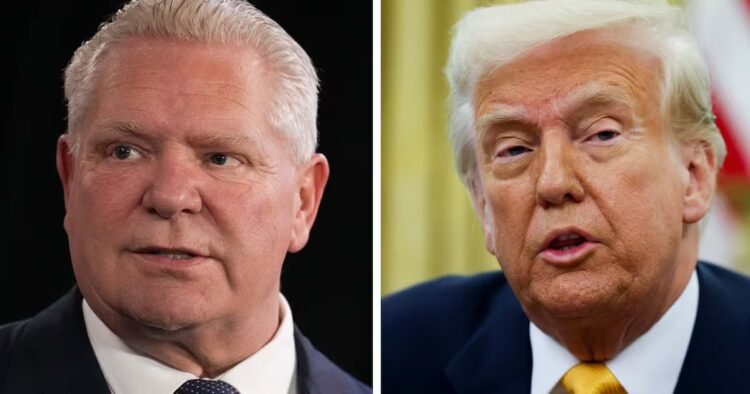Ontario Premier Doug Ford has agreed to suspend the province’s 25 percent surcharge on electricity exports to the United States after U.S. Commerce Secretary Howard Lutnick extended an “olive branch” and invited him to Washington for discussions.
Ford, speaking at Queen’s Park on Tuesday following his call with Lutnick, emphasized the need to lower tensions in the ongoing trade dispute.
“In any negotiation, there’s a point where emotions run high, and it’s crucial to bring the temperature down. I felt this was the right decision,” Ford said.
The move follows heightened tensions between Canada and the U.S. after President Donald Trump threatened to double tariffs on Canadian steel and aluminum in response to Ontario’s electricity tax.
“When someone extends an olive branch, the worst thing a leader can do is ignore it,” Ford added. “We need to sit down and move forward constructively.”
Ford and federal Finance Minister Dominic LeBlanc are scheduled to meet with U.S. trade representatives on Thursday to discuss updates to the United States-Mexico-Canada Agreement (USMCA).
Trump Responds to Ontario’s Decision
Shortly after Ford announced the suspension of the surcharge, Trump praised the move, calling Ford a “very strong man.”
“I respect that decision,” Trump told reporters. “It would have been a very bad thing if he didn’t do it.”
Following Ford’s announcement, the White House confirmed it would no longer pursue doubling tariffs on Canadian steel and aluminum.
However, in a post on Truth Social, Trump criticized Canada’s use of electricity as a bargaining tool, questioning why the U.S. relies on foreign power.
“Who made these decisions, and why? Can you imagine Canada stooping so low as to use ELECTRICITY, which affects innocent lives, as a bargaining chip?” Trump wrote.
He also warned that further tariffs on Canadian exports, including automobiles, could follow if other trade barriers remain in place.
Ontario’s Strategy and U.S. Reaction
Ford admitted that Ontario’s electricity surcharge was a strategic move to get the U.S.’s attention.
“Sometimes you have to play your cards,” he said. “This was one of those moments, and now we’re going to have a constructive discussion.”
Ontario supplies electricity to 1.5 million homes and businesses in New York, Michigan, and Minnesota. The surcharge was expected to generate $300,000 to $400,000 daily, adding roughly CAD$100 per month to some American utility bills.
In response, New York Governor Kathy Hochul welcomed Ontario’s decision to pause the surcharge but criticized Trump’s broader trade policies.
“Trump’s trade war will only hurt working families. It needs to end,” Hochul wrote on X.
Political and Economic Fallout
Ford’s decision to step back from the electricity surcharge comes amid increasing political and economic uncertainty.
“Cooler heads must prevail, or we risk devastating both economies,” Ford said in a television interview.
While some in Canada welcomed Ford’s move as a de-escalation, others urged retaliation against Trump’s tariffs. Conservative Leader Pierre Poilievre called for immediate countermeasures, arguing that Canada must stand firm against unfair U.S. trade policies.
Meanwhile, Prime Minister-designate Mark Carney described Trump’s latest tariffs as “an attack on Canadian workers, families, and businesses.”
“My government will ensure our response has maximum impact in the U.S. while minimizing harm to Canadians,” Carney said in a statement.
Ford maintains that sitting down at the negotiating table is the best path forward.
“We are the closest allies in the world, yet we’re fighting each other while China watches and benefits. It’s time to resolve this issue,” Ford said.

 English
English



























































